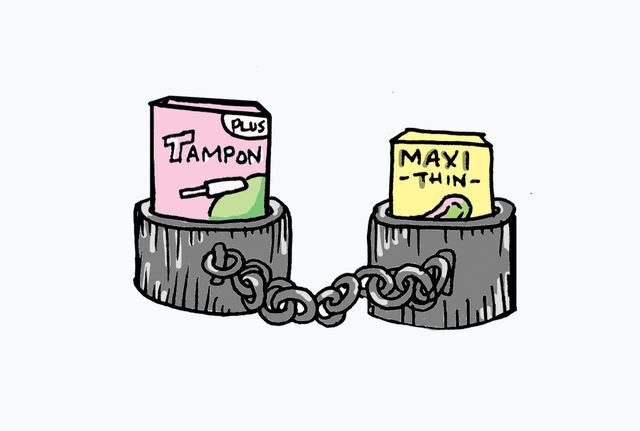Recent legislation has been proposed to restore incarcerated women with basic dignity, providing unlimited access to feminine hygiene products.
In Arizona’s only women’s state prison, incarcerated women are provided only 12 free menstruation pads per month and restricted from possessing more than 24 pads at any given time. Tampons are not given freely. To acquire more pads or tampons, prisoners must use their barely existing wage to purchase these products. Base pay in the prison is about 15 cents per hour. A woman would need to work around 21 hours to pay for an additional set of pads and around 26 hours to afford a $3.99 box of tampons.
The average cycle of menstruation occurs every 21 to 35 days and lasts anywhere from two to seven days. Doctors recommend a woman should change her pad or tampon every four to six hours to avoid infection. By these guidelines, a woman would require 20 pads or tampons per period cycle. This does not account for women with irregularities who receive their cycle more than once a month or for women who tend to have heavier flows during menstruation.
A woman who does not have the necessary products will likely end up bleeding through her clothes, a violation of the prisons dress code, which could result in loss of visitation, phone calls and ability to make any purchases from the prison store- including tampons and pads.
The proposed bill by Rep. Athena Salman seeks to correct the ludicrous restrictions on feminine hygiene products, ensuring women incarcerated in state prisons receive free and unlimited access to hygiene products. Salma was inspired to propose this after the state of Colorado passed a bill allocating $40,000 to provide the female inmates with free tampons. Her bill suggests appropriating $80,000 from the state’s general fund to support the provision of pads and tampons for the Arizona state prison which has double the number of inmates as the state prison in Colorado.
Arizona is not the only state fighting to restore its female incarcerated population with basic dignity. In addition to Colorado: Maryland, Virginia and Nebraska have introduced similar legislation in the past year to ensure prisoners are provided with the necessary products.
Formerly incarcerated women gathered in front of the Arizona House of Representatives to share their stories of the regular degradation, embarrassment and begging they frequently endured as prisoners attempting to maintain proper hygiene. Women shared stories of having to plead with male correctional officers to provide hygiene products and being given miniature, flimsy pads, insufficient for any adult woman. The prisoners impending needs sparked an innovation as women began to strip these pads apart to assemble makeshift tampons. They were then written up for possession of contraband if found with these self-assembled tampons. What is a regular monthly occurrence for women and girls has been turned into a barbaric, extraneous and humiliating experience for women behind bars.
Despite hearing these moving testimonials from formerly incarcerated women, many male House Representatives were critical of the bill or refused to recognize the legitimacy of the issue altogether.
Rep. Anthony Kern, R-Glendale, said giving prisoners more feminine-hygiene products would likely result in “a lot of frivolous actions.”
Rep. Jay Lawrence, the committee chairman, said, “I’m almost sorry I heard the bill.” He added, “I didn’t expect to hear pads and tampons and the problems of periods.”
Jennifer Weis Wolf, an advocate for menstrual equality, says the problem is not just the lack of the availability of products but the incessant hoops women must jump through to access them.
“It is the power dynamic to which women inmates are subject overall ― which is then exacerbated by menstruation,” Weiss-Wolf said. “If it leads to their denial of essential products like tampons and pads ― and we hear frequently that indeed it does ― access becomes a matter of health and human dignity.”
– Temi Ikudayisi is a public relations senior
Tampons in prison are a basic necessity
February 25, 2018
Illustration by Makenna Timoteo | Staff Illustrator
Donate to The University Star
Your donation will support the student journalists of Texas State University. Your contribution will allow us to purchase equipment and cover our annual website hosting costs.



















